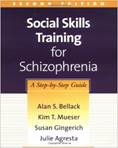MIRECC / CoE
VISN 5 MIRECC Matters Fall 2021 - EBP Advances: First Evaluation of SST-Telehealth

EBP Advances: First Evaluation of SST-Telehealth Shows Positive Preliminary Results
Rebecca Melissa Pasillas, Ph.D. and
Elizabeth Gilbert, Ph.D.
VA Social Skills Training Program
Inside the Fall 2021 Issue:
- Directors Corner: Peer Specialist Facilitated Groups for Women Veterans
- Innovative Bystander Training Aims to Reduce Harassment of Women Veterans
- EBP Advances: First Evaluation of SST-Telehealth Shows Positive Preliminary Results
- VHA Expands Psychosocial Rehabilitation Advanced Fellowship Training
- MIRECC Research Highlights

Social Skills Training (SST; Bellack et al., 2004) is an evidence-based group intervention that typically meets in person and uses behavioral learning techniques, such as role plays, to help Veterans improve their interpersonal skills and achieve their personal recovery goals. To adapt to the COVID-19 pandemic, the SST Training Program, headquartered at the VISN 5 MIRECC, developed a telehealth adaptation of SST so that high quality SST could still be delivered to Veterans using VA’s telehealth platform, VA Video Connect (VVC). After careful delivery and evaluation of SST telehealth (SST-T) sessions, and further Veteran input from focus groups and feedback surveys, preliminary evidence suggests that SST-T is deliverable over telehealth and appealing to Veteran participants.
The SST-T group was offered to Veterans participating in the Psychosocial Rehabilitation and Recovery Center (PRRC) within the VA Maryland Health Care System. The group met weekly in VVC for 15 group sessions with two national SST trainers co-facilitating most sessions. The national trainers completed a structured tracking log that documented group activities like Veteran attendance, number of role plays, adaptation considerations to SST-T protocol, technical issues, and satisfaction levels for each session. Fidelity to the SST model was evaluated by an author (RP) using the Social Skills Group Observation Checklist (SSGOC; Bellack et al., 2004, 285-286). Finally, four group members completed a brief feedback survey and participated in a focus group after the 15 sessions.
Overall, the Veteran participants were highly satisfied and reported that the technology was easy to manage, they liked to practice the skills, and the SST-T group was more interactive and engaging than other telehealth groups they attended. There were mixed reactions to the 75-minute length of the SST-T sessions with some preferring the length while others wanted shorter (hour-long) sessions. Group facilitators also documented that group members consistently completed outside practice assignments, a key part of SST.
The two group facilitators reported being, on average, “very satisfied” when leading or co-leading each SST-T group session. Seven SST-T sessions were evaluated, and all met fidelity to the SST model. Some helpful adaptations were identified which will support other SST facilitators delivering SST-T throughout VA. For example, skills that incorporate eye contact were modified to discuss making eye contact when videoconferencing. Facilitators also identified helpful modifications to the SST-T protocol, like adding a “housekeeping” part to the agenda, which involved reminders about handouts and confirming each Veterans’ emergency contact information, per VA telehealth policy.
The VA SST Training Program will make minor improvements to the SST-T protocol based on the results of this program evaluation and has plans for further evaluation of SST-T. VA SST providers who want to offer SST-T during the pandemic can attend SST-T webinars and an ongoing, monthly SST-T Community of Practice meeting. Announcements regarding the SST-T training events are sent via email to all VA SST providers. If you are a VA SST provider, and you have not received these announcements, please reach out to the SST Program Coordinator Laché Wilkins at lache.wilkins@va.gov to be added to the email list. If you are interested in participating in the comprehensive VA SST Training Program to become a VA SST Provider, you can also reach out to Ms. Wilkins. More information about SST and the VA SST Training Program is available at the SST website: http://www.mirecc.va.gov/visn5/training/social_skills.asp.
References:
- Bellack, A. S., Mueser, K. T., Gingerich, S., & Agresta, J. (2004). Social skills training for schizophrenia: A step-by-step guide (2nd ed.). The Guilford Press.



















